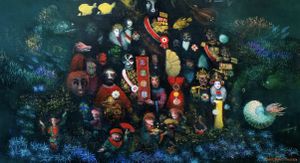Varun Grover, the renowned comedian and writer, has recently made waves with his pointed commentary on the burgeoning influencer culture, particularly targeting personalities like Ranveer Allahbadia, widely known as Beer Biceps. His remarks, delivered with characteristic sarcasm, critique the propensity of social media influencers to position themselves as motivational figures without any substantial expertise.
During one of his performances, Grover jested about the naming conventions of influencers, insisting, "Beer biceps. The one who has such a name, his show should have been shut a long time ago." His comments highlight the ridiculousness he perceives within the influencer ecosystem, which many fans and critics have found to be both relatable and amusing.
The backdrop for Grover’s critique also includes legal controversies spiraling from remarks made by Allahbadia on Samay Raina's show, India's Got Latent, which recently faced backlash for inappropriate comments. Grover, embracing the comedic spirit, poked fun at the situation, saying, "If I have to go to jail, it should at least be because of the high-quality 4K video." He urged his audience not to capture any weak-quality recordings of his set for fear they would misrepresent him.
Grover's critique is not merely limited to jabs at individual influencers. He provides broader reflections on the entertainment industry, likening it to a massive dinosaur under which creatives are stuck, saying, "Take an industry, there is a system, like ours is a 100-year-old film industry, it’s like there is a big dinosaur, under which we all are buried, and slowly we try and make it out underneath it." This metaphor reveals his belief in the sluggish pace of change, even as he recognizes gradual progress.
Describing the past, Grover commented, "Writer is a Baap," emphasizing the influential role writers once had during the golden era of Indian cinema, propelled by legends like Salim Khan and Javed Akhtar. Yet, he expressed disappointment over the diminishing prominence of writers today, reflecting on how the industry's structure has altered over time.
Nonetheless, Grover recognizes the shift instigated by digital platforms, which have allowed for innovative storytelling methods to emerge. "After [the golden era], I don’t think this era has come back, but there is a shift, thanks to so many platforms, channels, and so many avenues of making a film," he observed. This sense of hope is echoed by the flourishing focus on narratives, indicating to Grover and others the resurgence of storytelling at the forefront of the creative process.
His upcoming film, Superboys of Malegaon, exemplifies this new focus on grassroots filmmaking. Inspired by the documentary Supermen of Malegaon, the film tells the story of Nasir Shaikh and fellow amateur filmmakers from Malegaon, showcasing their ingenuity as they create cinematic magic against the odds.
Superboys of Malegaon, which Grover wrote and Reema Kagti directed, is anticipated to resonate with audiences for its authentic storytelling and celebration of the community-driven film industry. It features budding talents like Adarsh Gourav, Vineet Kumar Singh, Shashank Arora, Anuj Singh Duhan, and Riddhi Kumar, all of whom embody the essence of creativity and resilience.
While the digital world continues to shift landscapes within the entertainment industry, Varun Grover’s commentary reminds us of the necessity for depth and sincerity both behind the camera and online.
The conversation around influencers versus traditional creators is bound to keep heating up as public perceptions evolve, but Grover’s perspective serves as both critique and motivation for aspiring content creators who wish to carve their own paths amid these changing dynamics.
Whether through humor or sincere reflection, Varun Grover remains committed to pushing boundaries and challenging norms within both the comedic and cinematic realms.



